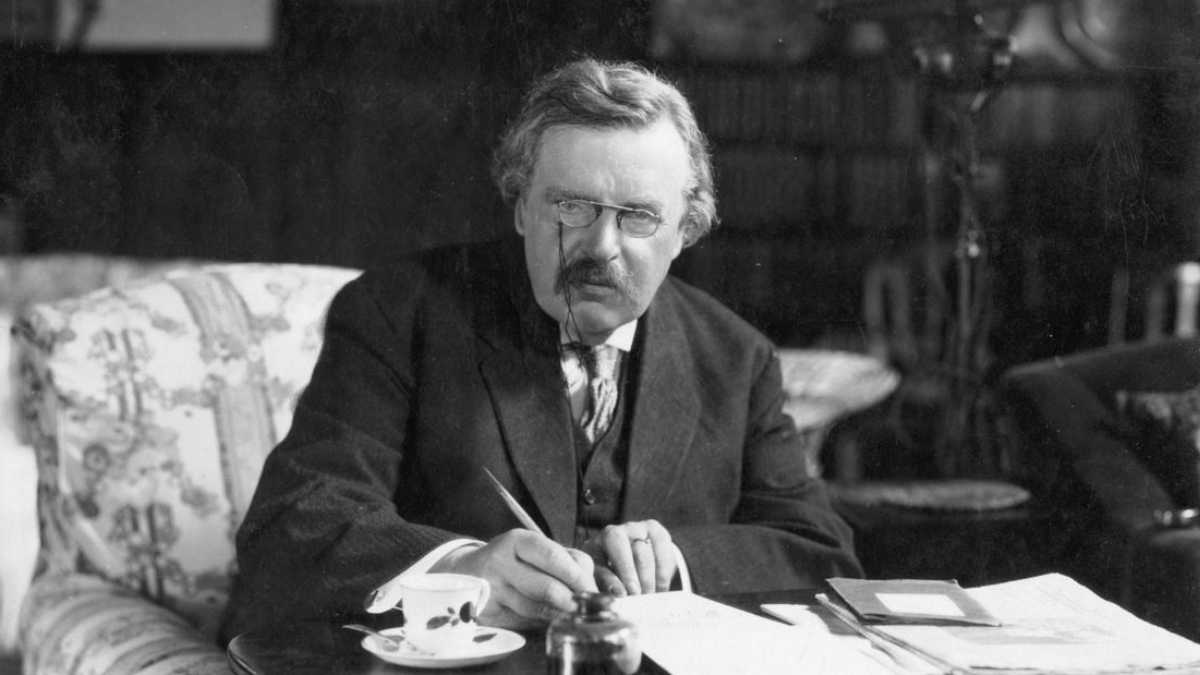

Was Chesterton Antisemitic?
His words may at times offend our post-Holocaust sensibilities, but taken in context, Chesterton emerges mostly as a friend and defender of the Jews.
10/14/22
John Stonestreet and Glenn Sunshine

Recently, the writing of G.K. Chesterton has undergone a resurgence of popularity. His Father Brown stories have always been popular, but his theological works, such as Orthodoxy, Heretics, The Everlasting Man, and collections of his essays, are being rediscovered. It’s not hard to see why. Chesterton’s prose sparkles with wit and humor and is leavened with incisive thinking and observations about human nature. A committed Roman Catholic who had nothing good to say about Calvinists (largely due to an overly strict Calvinistic upbringing), Chesterton is even popular in many Reformed Christian circles. There are even some who refer to themselves as “Chestertonian Calvinists,” a term he most certainly would not have embraced.
Of course, Chesterton also had, and still has, his critics. The most serious charge is that he was antisemitic. In his voluminous writings, there are passages that can be read as antisemitic, particularly as we look back on them in the wake of the Holocaust. The most serious of these are his condemnations of “financial Jews,” his reference to the “Jewish Problem” or “Jewish Question,” and his relatively soft stance against Hitler. What are we to make of these?
First, negative comments about Jews are rare in Chesterton’s writings—far rarer than his criticism of bankers, politicians, educators, the Irish, and any number of other groups. In fact, his harshest words were aimed squarely at the English.
His comments about “financial Jews” are better understood in the context of his tireless championing of the poor and his harsh criticism of usury, when money is lent at ridiculously high rates. Here, Chesterton succumbs to stereotypes common in his day and age. Since the Middle Ages, the Jews were associated with money lending, finance, and banking.
Because the Catholic Church in the Middle Ages prohibited lending money at interest and Jews were often not permitted to own land or engage in most trades, money lending was one of the few options available to Jews to make a living. This led to the idea of Jewish bankers secretly running the world. Chesterton did not go that far, but he was a product of an era that saw Jews as being heavily involved in banking and finance. Chesterton’s criticism of usury and bankers for exploiting the poor included but was not limited to Jewish financiers.
In referencing the phrase the “Jewish Question,” Chesterton was using language from Jewish thinkers in the 19th century. The “Jewish Question” was what to do about the Jews, a people with no homeland, who suffered from antisemitic bigotry wherever they lived. Chesterton’s use of the phrase was thus anything but antisemitic, especially since his answer was that the Jews should be granted a homeland in the Middle East, a reborn nation of Israel. Chesterton was a Zionist, hardly what one would expect from an antisemite!
But what about Chesterton’s being soft on Hitler? Like many people watching Hitler’s rise to power, Chesterton thought he was little more than a puppet at the hands of smarter men, which is the context in which his softer comments on Hitler were made. He did not have the benefit of hindsight to see just how dangerous this man was.
Further, Chesterton referred to Hitler in a series of pamphlets as a crank, a gangster, and a tool. There is no hint of an endorsement of him or Nazi policies. In fact, Chesterton warned the world about the danger of Hitler’s racialist theories long before many others were willing to speak out against them. He said he was appalled by Hitler’s atrocities and his scapegoating of the Jews, and that accepting Hitler’s dictatorship was the most stupid thing anyone had done in the past two or three centuries. In fact, Chesterton said all of that by 1936, the year he died.
Other less serious charges of antisemitism include his idea that Jews should wear distinctive clothing. Chesterton said this and expressed a preference that it be inspired by Middle Eastern clothing. He also advocated national clothing for the English, the French, and the Germans as a way of expressing unique cultural histories. This is a far cry from the yellow stars of David pushed by the Nazis.
Chesterton could be critical of specific individuals who happened to be Jewish, but he was a close friend to many others. Further, Chesterton specifically disavowed antisemitism, a stance supported by the generosity of spirit that pervades his writing. His words may at times offend our post-Holocaust sensibilities, but taken in context, Chesterton emerges mostly as a friend and defender of the Jews.
This month, the Colson Center has teamed up with Chesterton scholar Dale Ahlquist to create an exclusive set of videos on Chesterton’s understanding of the purpose of family. Ahlquist has recently compiled a new book of Chesterton’s essays, titled The Story of the Family. For a gift of any amount, you may receive this book and access to the video series at colsoncenter.org/October.
Have a Follow-up Question?
Related Content

© Copyright 2020, All Rights Reserved.














